Gerontological Nursing: Impact of Transitions on Aging Adults
VerifiedAdded on 2022/08/14
|11
|3121
|13
Report
AI Summary
This paper delves into the critical aspects of gerontological nursing, focusing on the transitions experienced by older adults, particularly those related to retirement and health changes. It examines the multifaceted impact of these transitions, including psychosocial, existential, and familial ramifications. The paper highlights the challenges older adults face, such as mental and physical health issues, loss, grief, and the need for home care services. It further discusses the role of nurses in providing specialized care, including the implementation of transition care models to improve patient outcomes and support both the older adults and their families. The study emphasizes the importance of geriatric nursing in addressing the unique needs of this population, advocating for comprehensive care strategies to promote their well-being and independence. The paper also discusses the impact of retirement on the physical and mental health of older adults and highlights the importance of proper care to ensure the well-being of the elderly population. The paper also discusses the International Classification of Disease (ICD-9) and how it determines the health status codes for various diseases such as diabetes, asthma, arthritis, hypertension, and depression. The assignment adheres to APA guidelines and provides a comprehensive overview of gerontological nursing.
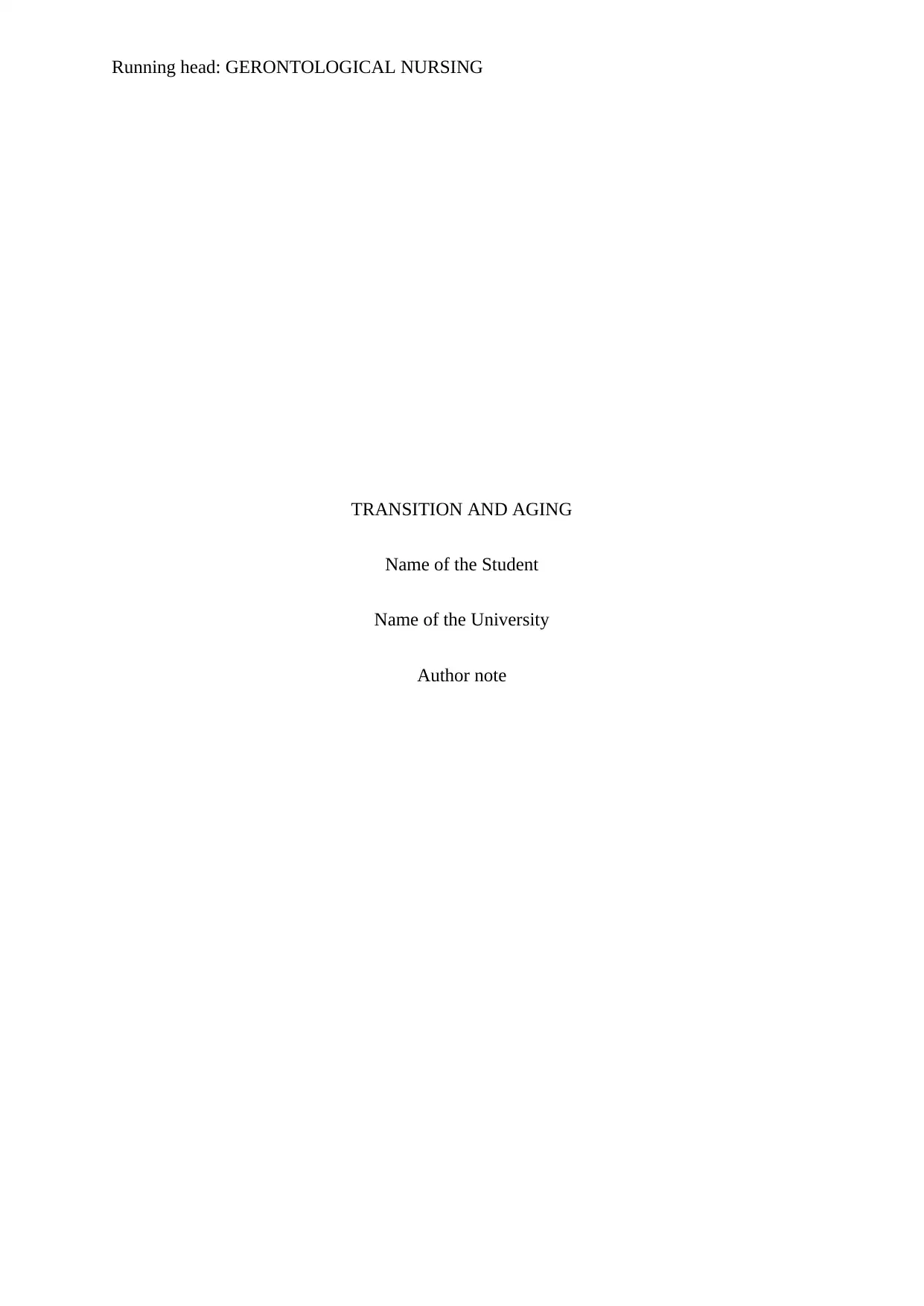
Running head: GERONTOLOGICAL NURSING
TRANSITION AND AGING
Name of the Student
Name of the University
Author note
TRANSITION AND AGING
Name of the Student
Name of the University
Author note
Paraphrase This Document
Need a fresh take? Get an instant paraphrase of this document with our AI Paraphraser
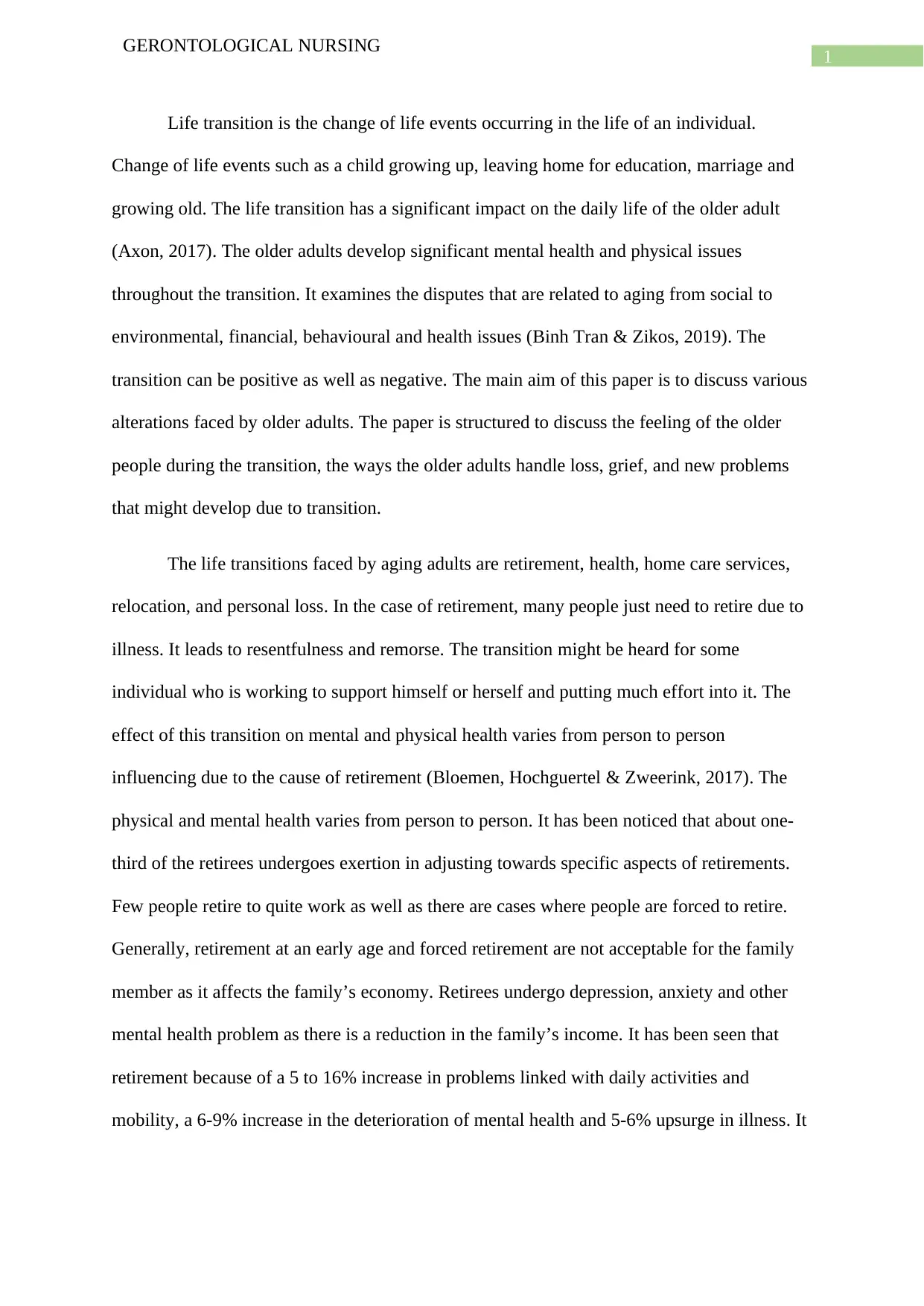
1
GERONTOLOGICAL NURSING
Life transition is the change of life events occurring in the life of an individual.
Change of life events such as a child growing up, leaving home for education, marriage and
growing old. The life transition has a significant impact on the daily life of the older adult
(Axon, 2017). The older adults develop significant mental health and physical issues
throughout the transition. It examines the disputes that are related to aging from social to
environmental, financial, behavioural and health issues (Binh Tran & Zikos, 2019). The
transition can be positive as well as negative. The main aim of this paper is to discuss various
alterations faced by older adults. The paper is structured to discuss the feeling of the older
people during the transition, the ways the older adults handle loss, grief, and new problems
that might develop due to transition.
The life transitions faced by aging adults are retirement, health, home care services,
relocation, and personal loss. In the case of retirement, many people just need to retire due to
illness. It leads to resentfulness and remorse. The transition might be heard for some
individual who is working to support himself or herself and putting much effort into it. The
effect of this transition on mental and physical health varies from person to person
influencing due to the cause of retirement (Bloemen, Hochguertel & Zweerink, 2017). The
physical and mental health varies from person to person. It has been noticed that about one-
third of the retirees undergoes exertion in adjusting towards specific aspects of retirements.
Few people retire to quite work as well as there are cases where people are forced to retire.
Generally, retirement at an early age and forced retirement are not acceptable for the family
member as it affects the family’s economy. Retirees undergo depression, anxiety and other
mental health problem as there is a reduction in the family’s income. It has been seen that
retirement because of a 5 to 16% increase in problems linked with daily activities and
mobility, a 6-9% increase in the deterioration of mental health and 5-6% upsurge in illness. It
GERONTOLOGICAL NURSING
Life transition is the change of life events occurring in the life of an individual.
Change of life events such as a child growing up, leaving home for education, marriage and
growing old. The life transition has a significant impact on the daily life of the older adult
(Axon, 2017). The older adults develop significant mental health and physical issues
throughout the transition. It examines the disputes that are related to aging from social to
environmental, financial, behavioural and health issues (Binh Tran & Zikos, 2019). The
transition can be positive as well as negative. The main aim of this paper is to discuss various
alterations faced by older adults. The paper is structured to discuss the feeling of the older
people during the transition, the ways the older adults handle loss, grief, and new problems
that might develop due to transition.
The life transitions faced by aging adults are retirement, health, home care services,
relocation, and personal loss. In the case of retirement, many people just need to retire due to
illness. It leads to resentfulness and remorse. The transition might be heard for some
individual who is working to support himself or herself and putting much effort into it. The
effect of this transition on mental and physical health varies from person to person
influencing due to the cause of retirement (Bloemen, Hochguertel & Zweerink, 2017). The
physical and mental health varies from person to person. It has been noticed that about one-
third of the retirees undergoes exertion in adjusting towards specific aspects of retirements.
Few people retire to quite work as well as there are cases where people are forced to retire.
Generally, retirement at an early age and forced retirement are not acceptable for the family
member as it affects the family’s economy. Retirees undergo depression, anxiety and other
mental health problem as there is a reduction in the family’s income. It has been seen that
retirement because of a 5 to 16% increase in problems linked with daily activities and
mobility, a 6-9% increase in the deterioration of mental health and 5-6% upsurge in illness. It
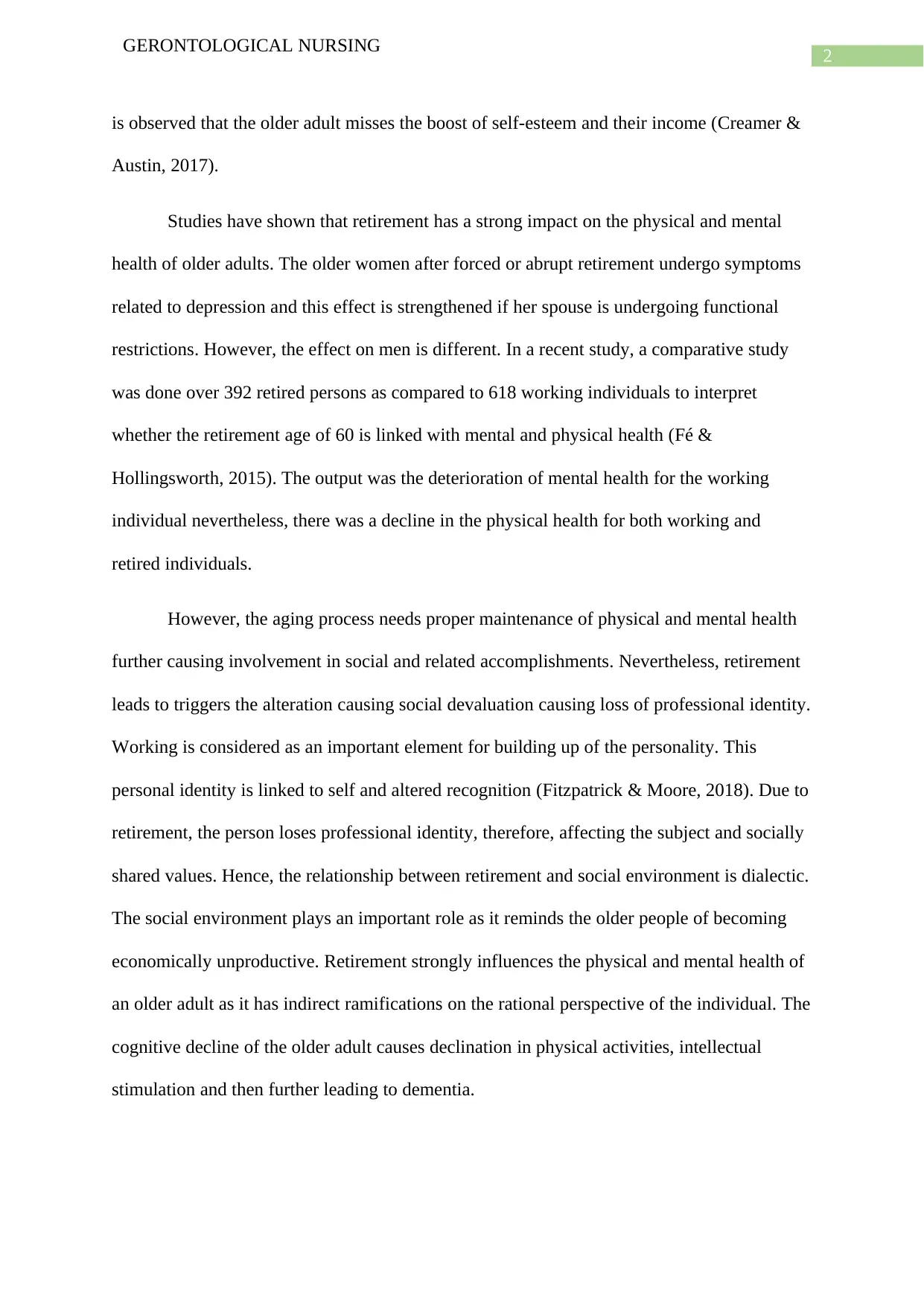
2
GERONTOLOGICAL NURSING
is observed that the older adult misses the boost of self-esteem and their income (Creamer &
Austin, 2017).
Studies have shown that retirement has a strong impact on the physical and mental
health of older adults. The older women after forced or abrupt retirement undergo symptoms
related to depression and this effect is strengthened if her spouse is undergoing functional
restrictions. However, the effect on men is different. In a recent study, a comparative study
was done over 392 retired persons as compared to 618 working individuals to interpret
whether the retirement age of 60 is linked with mental and physical health (Fé &
Hollingsworth, 2015). The output was the deterioration of mental health for the working
individual nevertheless, there was a decline in the physical health for both working and
retired individuals.
However, the aging process needs proper maintenance of physical and mental health
further causing involvement in social and related accomplishments. Nevertheless, retirement
leads to triggers the alteration causing social devaluation causing loss of professional identity.
Working is considered as an important element for building up of the personality. This
personal identity is linked to self and altered recognition (Fitzpatrick & Moore, 2018). Due to
retirement, the person loses professional identity, therefore, affecting the subject and socially
shared values. Hence, the relationship between retirement and social environment is dialectic.
The social environment plays an important role as it reminds the older people of becoming
economically unproductive. Retirement strongly influences the physical and mental health of
an older adult as it has indirect ramifications on the rational perspective of the individual. The
cognitive decline of the older adult causes declination in physical activities, intellectual
stimulation and then further leading to dementia.
GERONTOLOGICAL NURSING
is observed that the older adult misses the boost of self-esteem and their income (Creamer &
Austin, 2017).
Studies have shown that retirement has a strong impact on the physical and mental
health of older adults. The older women after forced or abrupt retirement undergo symptoms
related to depression and this effect is strengthened if her spouse is undergoing functional
restrictions. However, the effect on men is different. In a recent study, a comparative study
was done over 392 retired persons as compared to 618 working individuals to interpret
whether the retirement age of 60 is linked with mental and physical health (Fé &
Hollingsworth, 2015). The output was the deterioration of mental health for the working
individual nevertheless, there was a decline in the physical health for both working and
retired individuals.
However, the aging process needs proper maintenance of physical and mental health
further causing involvement in social and related accomplishments. Nevertheless, retirement
leads to triggers the alteration causing social devaluation causing loss of professional identity.
Working is considered as an important element for building up of the personality. This
personal identity is linked to self and altered recognition (Fitzpatrick & Moore, 2018). Due to
retirement, the person loses professional identity, therefore, affecting the subject and socially
shared values. Hence, the relationship between retirement and social environment is dialectic.
The social environment plays an important role as it reminds the older people of becoming
economically unproductive. Retirement strongly influences the physical and mental health of
an older adult as it has indirect ramifications on the rational perspective of the individual. The
cognitive decline of the older adult causes declination in physical activities, intellectual
stimulation and then further leading to dementia.
⊘ This is a preview!⊘
Do you want full access?
Subscribe today to unlock all pages.

Trusted by 1+ million students worldwide
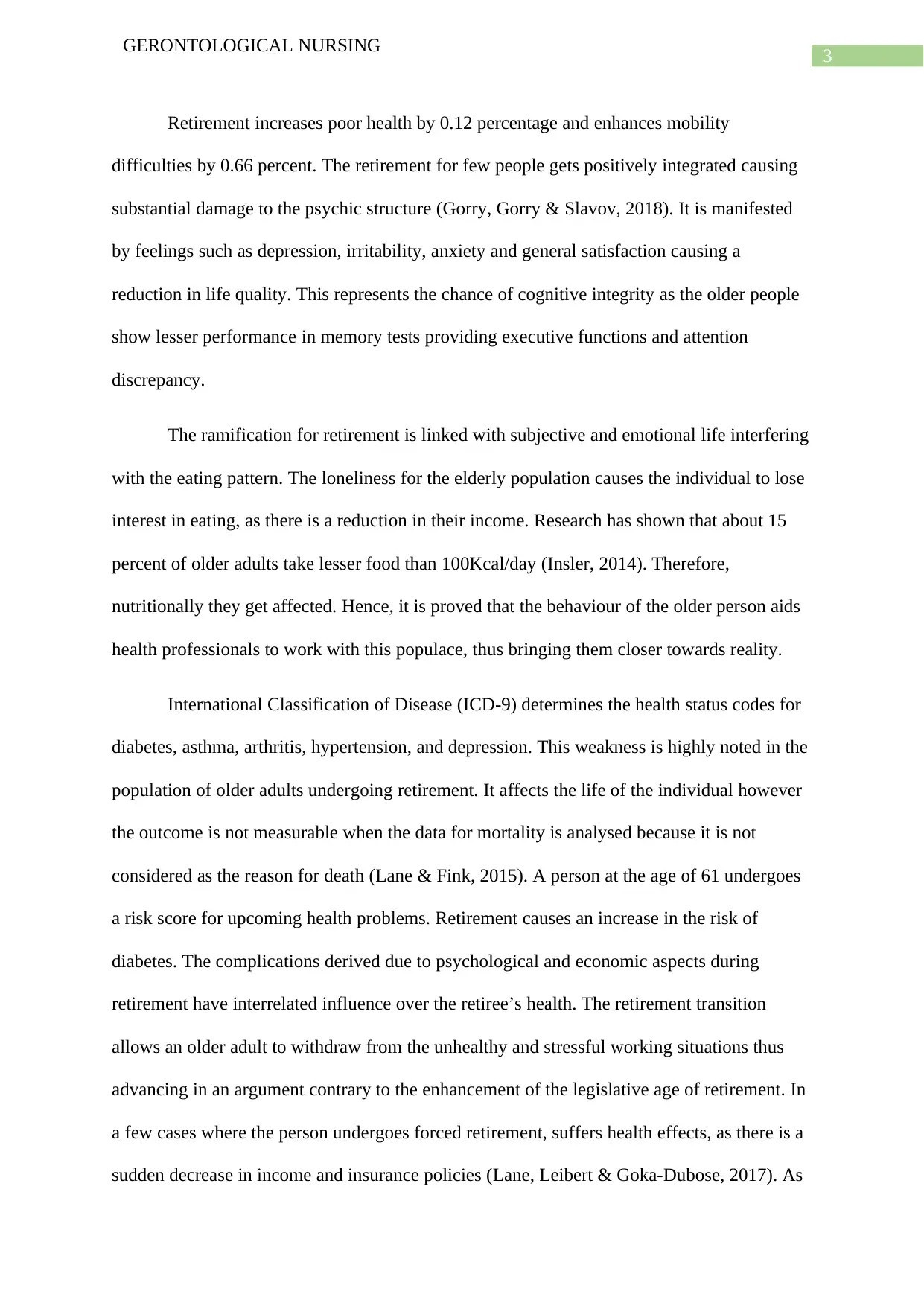
3
GERONTOLOGICAL NURSING
Retirement increases poor health by 0.12 percentage and enhances mobility
difficulties by 0.66 percent. The retirement for few people gets positively integrated causing
substantial damage to the psychic structure (Gorry, Gorry & Slavov, 2018). It is manifested
by feelings such as depression, irritability, anxiety and general satisfaction causing a
reduction in life quality. This represents the chance of cognitive integrity as the older people
show lesser performance in memory tests providing executive functions and attention
discrepancy.
The ramification for retirement is linked with subjective and emotional life interfering
with the eating pattern. The loneliness for the elderly population causes the individual to lose
interest in eating, as there is a reduction in their income. Research has shown that about 15
percent of older adults take lesser food than 100Kcal/day (Insler, 2014). Therefore,
nutritionally they get affected. Hence, it is proved that the behaviour of the older person aids
health professionals to work with this populace, thus bringing them closer towards reality.
International Classification of Disease (ICD-9) determines the health status codes for
diabetes, asthma, arthritis, hypertension, and depression. This weakness is highly noted in the
population of older adults undergoing retirement. It affects the life of the individual however
the outcome is not measurable when the data for mortality is analysed because it is not
considered as the reason for death (Lane & Fink, 2015). A person at the age of 61 undergoes
a risk score for upcoming health problems. Retirement causes an increase in the risk of
diabetes. The complications derived due to psychological and economic aspects during
retirement have interrelated influence over the retiree’s health. The retirement transition
allows an older adult to withdraw from the unhealthy and stressful working situations thus
advancing in an argument contrary to the enhancement of the legislative age of retirement. In
a few cases where the person undergoes forced retirement, suffers health effects, as there is a
sudden decrease in income and insurance policies (Lane, Leibert & Goka-Dubose, 2017). As
GERONTOLOGICAL NURSING
Retirement increases poor health by 0.12 percentage and enhances mobility
difficulties by 0.66 percent. The retirement for few people gets positively integrated causing
substantial damage to the psychic structure (Gorry, Gorry & Slavov, 2018). It is manifested
by feelings such as depression, irritability, anxiety and general satisfaction causing a
reduction in life quality. This represents the chance of cognitive integrity as the older people
show lesser performance in memory tests providing executive functions and attention
discrepancy.
The ramification for retirement is linked with subjective and emotional life interfering
with the eating pattern. The loneliness for the elderly population causes the individual to lose
interest in eating, as there is a reduction in their income. Research has shown that about 15
percent of older adults take lesser food than 100Kcal/day (Insler, 2014). Therefore,
nutritionally they get affected. Hence, it is proved that the behaviour of the older person aids
health professionals to work with this populace, thus bringing them closer towards reality.
International Classification of Disease (ICD-9) determines the health status codes for
diabetes, asthma, arthritis, hypertension, and depression. This weakness is highly noted in the
population of older adults undergoing retirement. It affects the life of the individual however
the outcome is not measurable when the data for mortality is analysed because it is not
considered as the reason for death (Lane & Fink, 2015). A person at the age of 61 undergoes
a risk score for upcoming health problems. Retirement causes an increase in the risk of
diabetes. The complications derived due to psychological and economic aspects during
retirement have interrelated influence over the retiree’s health. The retirement transition
allows an older adult to withdraw from the unhealthy and stressful working situations thus
advancing in an argument contrary to the enhancement of the legislative age of retirement. In
a few cases where the person undergoes forced retirement, suffers health effects, as there is a
sudden decrease in income and insurance policies (Lane, Leibert & Goka-Dubose, 2017). As
Paraphrase This Document
Need a fresh take? Get an instant paraphrase of this document with our AI Paraphraser
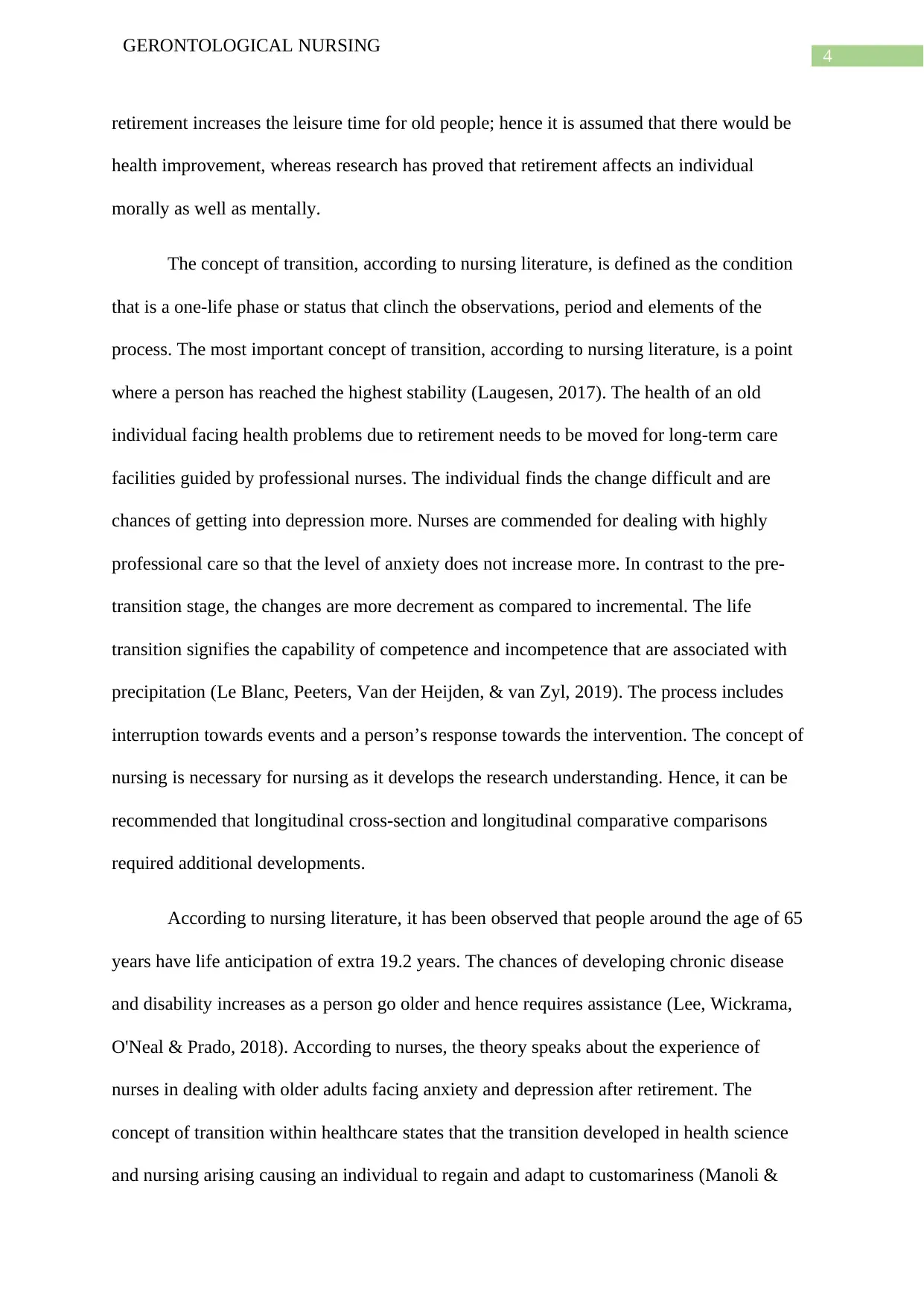
4
GERONTOLOGICAL NURSING
retirement increases the leisure time for old people; hence it is assumed that there would be
health improvement, whereas research has proved that retirement affects an individual
morally as well as mentally.
The concept of transition, according to nursing literature, is defined as the condition
that is a one-life phase or status that clinch the observations, period and elements of the
process. The most important concept of transition, according to nursing literature, is a point
where a person has reached the highest stability (Laugesen, 2017). The health of an old
individual facing health problems due to retirement needs to be moved for long-term care
facilities guided by professional nurses. The individual finds the change difficult and are
chances of getting into depression more. Nurses are commended for dealing with highly
professional care so that the level of anxiety does not increase more. In contrast to the pre-
transition stage, the changes are more decrement as compared to incremental. The life
transition signifies the capability of competence and incompetence that are associated with
precipitation (Le Blanc, Peeters, Van der Heijden, & van Zyl, 2019). The process includes
interruption towards events and a person’s response towards the intervention. The concept of
nursing is necessary for nursing as it develops the research understanding. Hence, it can be
recommended that longitudinal cross-section and longitudinal comparative comparisons
required additional developments.
According to nursing literature, it has been observed that people around the age of 65
years have life anticipation of extra 19.2 years. The chances of developing chronic disease
and disability increases as a person go older and hence requires assistance (Lee, Wickrama,
O'Neal & Prado, 2018). According to nurses, the theory speaks about the experience of
nurses in dealing with older adults facing anxiety and depression after retirement. The
concept of transition within healthcare states that the transition developed in health science
and nursing arising causing an individual to regain and adapt to customariness (Manoli &
GERONTOLOGICAL NURSING
retirement increases the leisure time for old people; hence it is assumed that there would be
health improvement, whereas research has proved that retirement affects an individual
morally as well as mentally.
The concept of transition, according to nursing literature, is defined as the condition
that is a one-life phase or status that clinch the observations, period and elements of the
process. The most important concept of transition, according to nursing literature, is a point
where a person has reached the highest stability (Laugesen, 2017). The health of an old
individual facing health problems due to retirement needs to be moved for long-term care
facilities guided by professional nurses. The individual finds the change difficult and are
chances of getting into depression more. Nurses are commended for dealing with highly
professional care so that the level of anxiety does not increase more. In contrast to the pre-
transition stage, the changes are more decrement as compared to incremental. The life
transition signifies the capability of competence and incompetence that are associated with
precipitation (Le Blanc, Peeters, Van der Heijden, & van Zyl, 2019). The process includes
interruption towards events and a person’s response towards the intervention. The concept of
nursing is necessary for nursing as it develops the research understanding. Hence, it can be
recommended that longitudinal cross-section and longitudinal comparative comparisons
required additional developments.
According to nursing literature, it has been observed that people around the age of 65
years have life anticipation of extra 19.2 years. The chances of developing chronic disease
and disability increases as a person go older and hence requires assistance (Lee, Wickrama,
O'Neal & Prado, 2018). According to nurses, the theory speaks about the experience of
nurses in dealing with older adults facing anxiety and depression after retirement. The
concept of transition within healthcare states that the transition developed in health science
and nursing arising causing an individual to regain and adapt to customariness (Manoli &
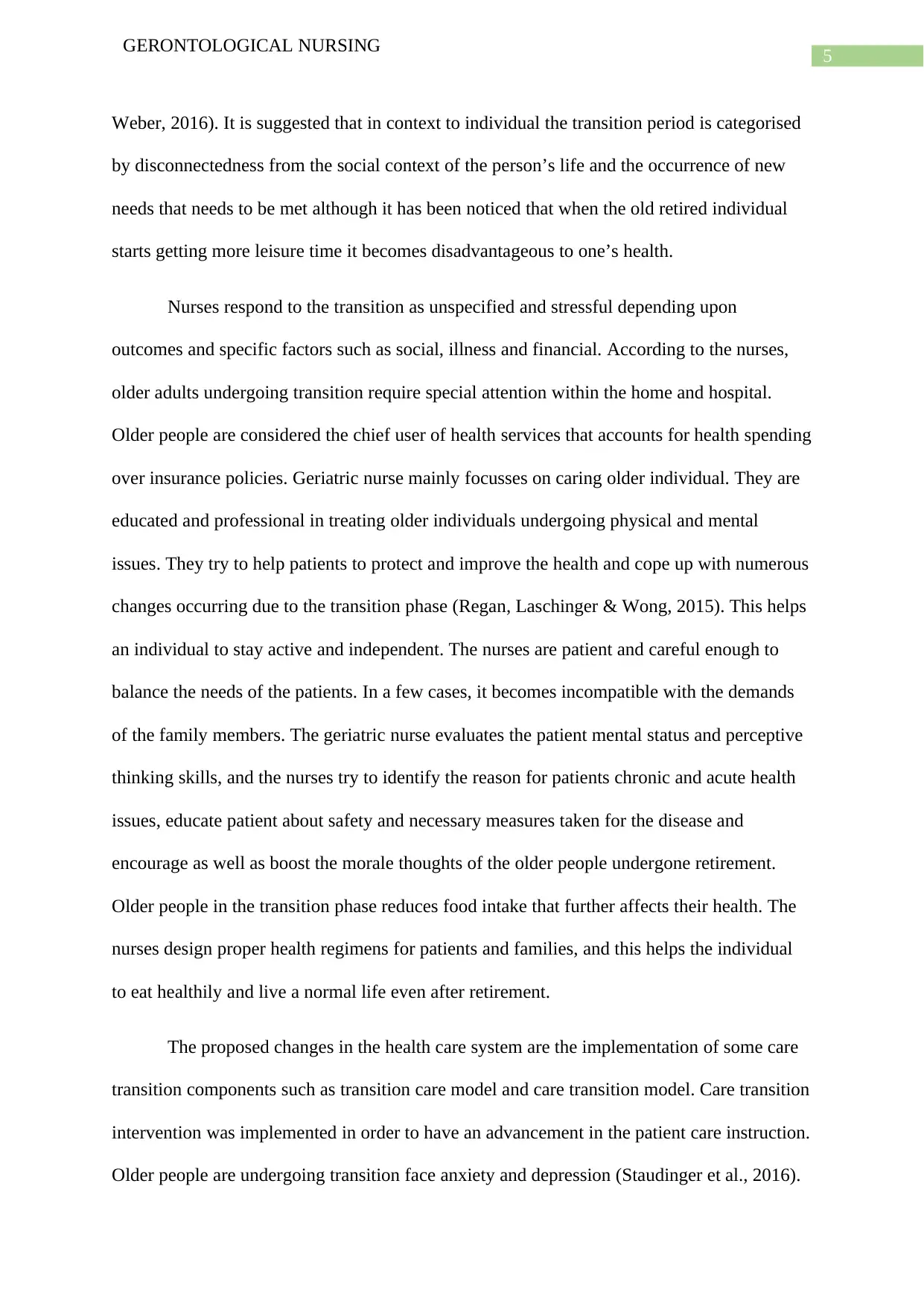
5
GERONTOLOGICAL NURSING
Weber, 2016). It is suggested that in context to individual the transition period is categorised
by disconnectedness from the social context of the person’s life and the occurrence of new
needs that needs to be met although it has been noticed that when the old retired individual
starts getting more leisure time it becomes disadvantageous to one’s health.
Nurses respond to the transition as unspecified and stressful depending upon
outcomes and specific factors such as social, illness and financial. According to the nurses,
older adults undergoing transition require special attention within the home and hospital.
Older people are considered the chief user of health services that accounts for health spending
over insurance policies. Geriatric nurse mainly focusses on caring older individual. They are
educated and professional in treating older individuals undergoing physical and mental
issues. They try to help patients to protect and improve the health and cope up with numerous
changes occurring due to the transition phase (Regan, Laschinger & Wong, 2015). This helps
an individual to stay active and independent. The nurses are patient and careful enough to
balance the needs of the patients. In a few cases, it becomes incompatible with the demands
of the family members. The geriatric nurse evaluates the patient mental status and perceptive
thinking skills, and the nurses try to identify the reason for patients chronic and acute health
issues, educate patient about safety and necessary measures taken for the disease and
encourage as well as boost the morale thoughts of the older people undergone retirement.
Older people in the transition phase reduces food intake that further affects their health. The
nurses design proper health regimens for patients and families, and this helps the individual
to eat healthily and live a normal life even after retirement.
The proposed changes in the health care system are the implementation of some care
transition components such as transition care model and care transition model. Care transition
intervention was implemented in order to have an advancement in the patient care instruction.
Older people are undergoing transition face anxiety and depression (Staudinger et al., 2016).
GERONTOLOGICAL NURSING
Weber, 2016). It is suggested that in context to individual the transition period is categorised
by disconnectedness from the social context of the person’s life and the occurrence of new
needs that needs to be met although it has been noticed that when the old retired individual
starts getting more leisure time it becomes disadvantageous to one’s health.
Nurses respond to the transition as unspecified and stressful depending upon
outcomes and specific factors such as social, illness and financial. According to the nurses,
older adults undergoing transition require special attention within the home and hospital.
Older people are considered the chief user of health services that accounts for health spending
over insurance policies. Geriatric nurse mainly focusses on caring older individual. They are
educated and professional in treating older individuals undergoing physical and mental
issues. They try to help patients to protect and improve the health and cope up with numerous
changes occurring due to the transition phase (Regan, Laschinger & Wong, 2015). This helps
an individual to stay active and independent. The nurses are patient and careful enough to
balance the needs of the patients. In a few cases, it becomes incompatible with the demands
of the family members. The geriatric nurse evaluates the patient mental status and perceptive
thinking skills, and the nurses try to identify the reason for patients chronic and acute health
issues, educate patient about safety and necessary measures taken for the disease and
encourage as well as boost the morale thoughts of the older people undergone retirement.
Older people in the transition phase reduces food intake that further affects their health. The
nurses design proper health regimens for patients and families, and this helps the individual
to eat healthily and live a normal life even after retirement.
The proposed changes in the health care system are the implementation of some care
transition components such as transition care model and care transition model. Care transition
intervention was implemented in order to have an advancement in the patient care instruction.
Older people are undergoing transition face anxiety and depression (Staudinger et al., 2016).
⊘ This is a preview!⊘
Do you want full access?
Subscribe today to unlock all pages.

Trusted by 1+ million students worldwide
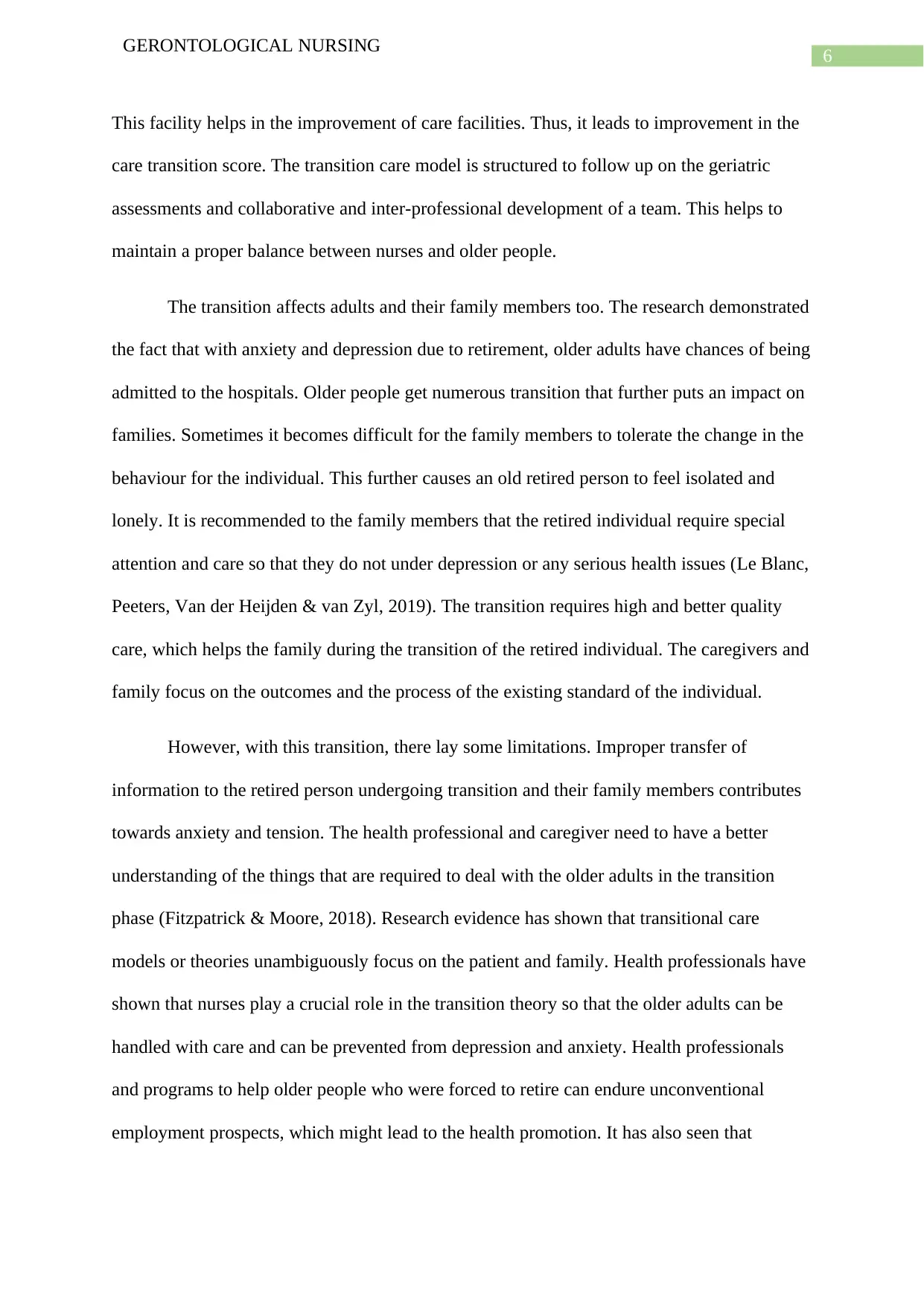
6
GERONTOLOGICAL NURSING
This facility helps in the improvement of care facilities. Thus, it leads to improvement in the
care transition score. The transition care model is structured to follow up on the geriatric
assessments and collaborative and inter-professional development of a team. This helps to
maintain a proper balance between nurses and older people.
The transition affects adults and their family members too. The research demonstrated
the fact that with anxiety and depression due to retirement, older adults have chances of being
admitted to the hospitals. Older people get numerous transition that further puts an impact on
families. Sometimes it becomes difficult for the family members to tolerate the change in the
behaviour for the individual. This further causes an old retired person to feel isolated and
lonely. It is recommended to the family members that the retired individual require special
attention and care so that they do not under depression or any serious health issues (Le Blanc,
Peeters, Van der Heijden & van Zyl, 2019). The transition requires high and better quality
care, which helps the family during the transition of the retired individual. The caregivers and
family focus on the outcomes and the process of the existing standard of the individual.
However, with this transition, there lay some limitations. Improper transfer of
information to the retired person undergoing transition and their family members contributes
towards anxiety and tension. The health professional and caregiver need to have a better
understanding of the things that are required to deal with the older adults in the transition
phase (Fitzpatrick & Moore, 2018). Research evidence has shown that transitional care
models or theories unambiguously focus on the patient and family. Health professionals have
shown that nurses play a crucial role in the transition theory so that the older adults can be
handled with care and can be prevented from depression and anxiety. Health professionals
and programs to help older people who were forced to retire can endure unconventional
employment prospects, which might lead to the health promotion. It has also seen that
GERONTOLOGICAL NURSING
This facility helps in the improvement of care facilities. Thus, it leads to improvement in the
care transition score. The transition care model is structured to follow up on the geriatric
assessments and collaborative and inter-professional development of a team. This helps to
maintain a proper balance between nurses and older people.
The transition affects adults and their family members too. The research demonstrated
the fact that with anxiety and depression due to retirement, older adults have chances of being
admitted to the hospitals. Older people get numerous transition that further puts an impact on
families. Sometimes it becomes difficult for the family members to tolerate the change in the
behaviour for the individual. This further causes an old retired person to feel isolated and
lonely. It is recommended to the family members that the retired individual require special
attention and care so that they do not under depression or any serious health issues (Le Blanc,
Peeters, Van der Heijden & van Zyl, 2019). The transition requires high and better quality
care, which helps the family during the transition of the retired individual. The caregivers and
family focus on the outcomes and the process of the existing standard of the individual.
However, with this transition, there lay some limitations. Improper transfer of
information to the retired person undergoing transition and their family members contributes
towards anxiety and tension. The health professional and caregiver need to have a better
understanding of the things that are required to deal with the older adults in the transition
phase (Fitzpatrick & Moore, 2018). Research evidence has shown that transitional care
models or theories unambiguously focus on the patient and family. Health professionals have
shown that nurses play a crucial role in the transition theory so that the older adults can be
handled with care and can be prevented from depression and anxiety. Health professionals
and programs to help older people who were forced to retire can endure unconventional
employment prospects, which might lead to the health promotion. It has also seen that
Paraphrase This Document
Need a fresh take? Get an instant paraphrase of this document with our AI Paraphraser
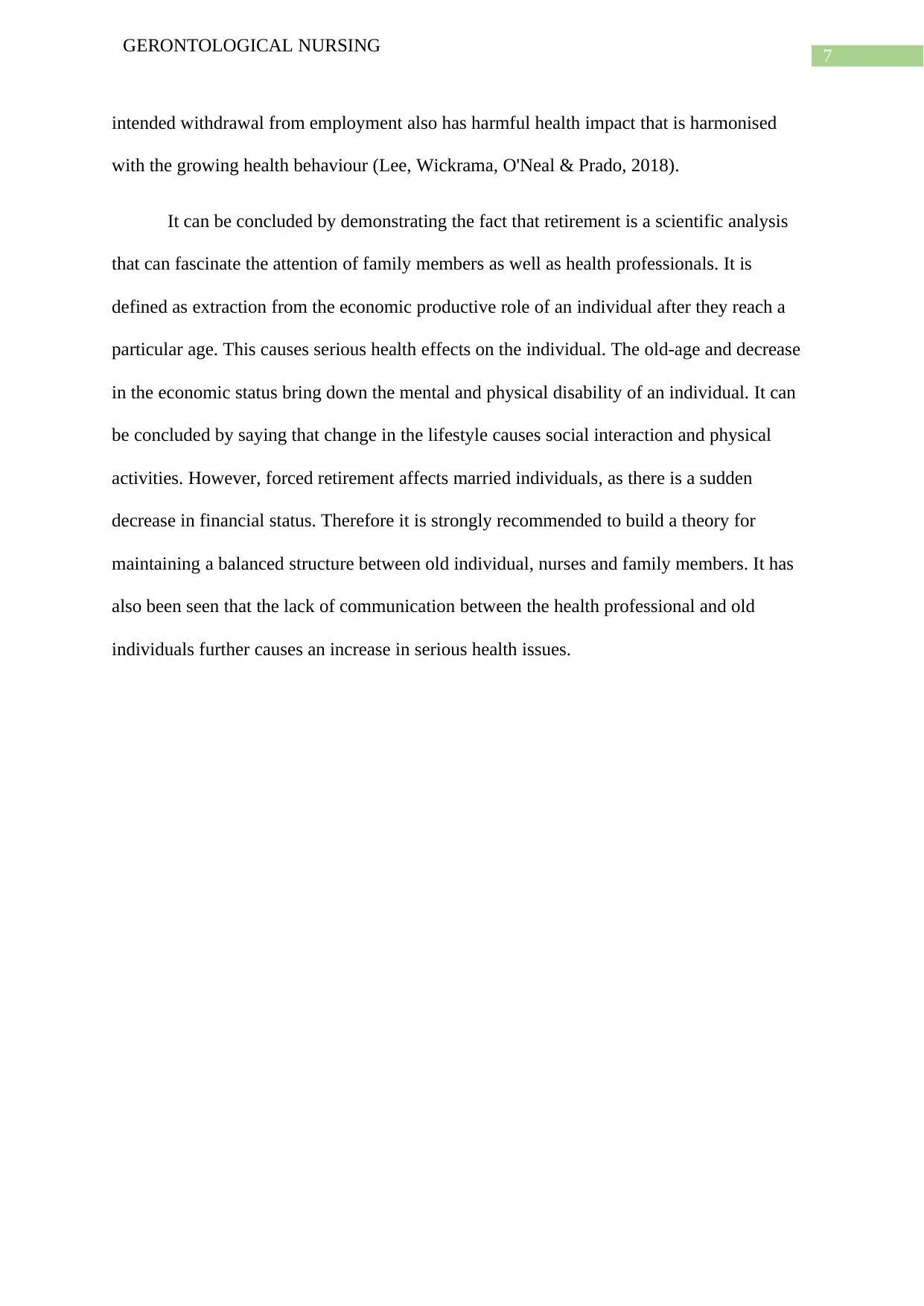
7
GERONTOLOGICAL NURSING
intended withdrawal from employment also has harmful health impact that is harmonised
with the growing health behaviour (Lee, Wickrama, O'Neal & Prado, 2018).
It can be concluded by demonstrating the fact that retirement is a scientific analysis
that can fascinate the attention of family members as well as health professionals. It is
defined as extraction from the economic productive role of an individual after they reach a
particular age. This causes serious health effects on the individual. The old-age and decrease
in the economic status bring down the mental and physical disability of an individual. It can
be concluded by saying that change in the lifestyle causes social interaction and physical
activities. However, forced retirement affects married individuals, as there is a sudden
decrease in financial status. Therefore it is strongly recommended to build a theory for
maintaining a balanced structure between old individual, nurses and family members. It has
also been seen that the lack of communication between the health professional and old
individuals further causes an increase in serious health issues.
GERONTOLOGICAL NURSING
intended withdrawal from employment also has harmful health impact that is harmonised
with the growing health behaviour (Lee, Wickrama, O'Neal & Prado, 2018).
It can be concluded by demonstrating the fact that retirement is a scientific analysis
that can fascinate the attention of family members as well as health professionals. It is
defined as extraction from the economic productive role of an individual after they reach a
particular age. This causes serious health effects on the individual. The old-age and decrease
in the economic status bring down the mental and physical disability of an individual. It can
be concluded by saying that change in the lifestyle causes social interaction and physical
activities. However, forced retirement affects married individuals, as there is a sudden
decrease in financial status. Therefore it is strongly recommended to build a theory for
maintaining a balanced structure between old individual, nurses and family members. It has
also been seen that the lack of communication between the health professional and old
individuals further causes an increase in serious health issues.
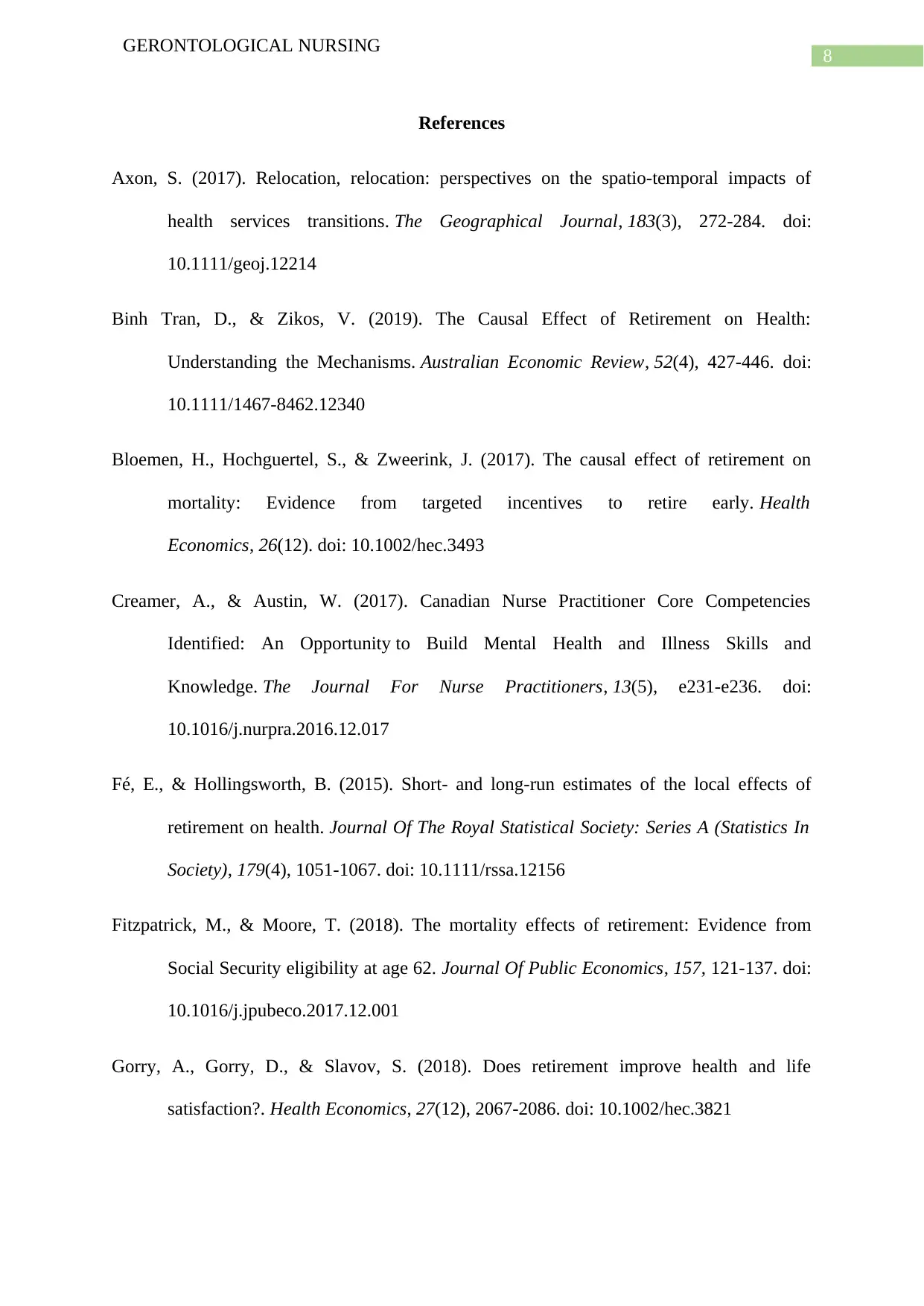
8
GERONTOLOGICAL NURSING
References
Axon, S. (2017). Relocation, relocation: perspectives on the spatio-temporal impacts of
health services transitions. The Geographical Journal, 183(3), 272-284. doi:
10.1111/geoj.12214
Binh Tran, D., & Zikos, V. (2019). The Causal Effect of Retirement on Health:
Understanding the Mechanisms. Australian Economic Review, 52(4), 427-446. doi:
10.1111/1467-8462.12340
Bloemen, H., Hochguertel, S., & Zweerink, J. (2017). The causal effect of retirement on
mortality: Evidence from targeted incentives to retire early. Health
Economics, 26(12). doi: 10.1002/hec.3493
Creamer, A., & Austin, W. (2017). Canadian Nurse Practitioner Core Competencies
Identified: An Opportunity to Build Mental Health and Illness Skills and
Knowledge. The Journal For Nurse Practitioners, 13(5), e231-e236. doi:
10.1016/j.nurpra.2016.12.017
Fé, E., & Hollingsworth, B. (2015). Short- and long-run estimates of the local effects of
retirement on health. Journal Of The Royal Statistical Society: Series A (Statistics In
Society), 179(4), 1051-1067. doi: 10.1111/rssa.12156
Fitzpatrick, M., & Moore, T. (2018). The mortality effects of retirement: Evidence from
Social Security eligibility at age 62. Journal Of Public Economics, 157, 121-137. doi:
10.1016/j.jpubeco.2017.12.001
Gorry, A., Gorry, D., & Slavov, S. (2018). Does retirement improve health and life
satisfaction?. Health Economics, 27(12), 2067-2086. doi: 10.1002/hec.3821
GERONTOLOGICAL NURSING
References
Axon, S. (2017). Relocation, relocation: perspectives on the spatio-temporal impacts of
health services transitions. The Geographical Journal, 183(3), 272-284. doi:
10.1111/geoj.12214
Binh Tran, D., & Zikos, V. (2019). The Causal Effect of Retirement on Health:
Understanding the Mechanisms. Australian Economic Review, 52(4), 427-446. doi:
10.1111/1467-8462.12340
Bloemen, H., Hochguertel, S., & Zweerink, J. (2017). The causal effect of retirement on
mortality: Evidence from targeted incentives to retire early. Health
Economics, 26(12). doi: 10.1002/hec.3493
Creamer, A., & Austin, W. (2017). Canadian Nurse Practitioner Core Competencies
Identified: An Opportunity to Build Mental Health and Illness Skills and
Knowledge. The Journal For Nurse Practitioners, 13(5), e231-e236. doi:
10.1016/j.nurpra.2016.12.017
Fé, E., & Hollingsworth, B. (2015). Short- and long-run estimates of the local effects of
retirement on health. Journal Of The Royal Statistical Society: Series A (Statistics In
Society), 179(4), 1051-1067. doi: 10.1111/rssa.12156
Fitzpatrick, M., & Moore, T. (2018). The mortality effects of retirement: Evidence from
Social Security eligibility at age 62. Journal Of Public Economics, 157, 121-137. doi:
10.1016/j.jpubeco.2017.12.001
Gorry, A., Gorry, D., & Slavov, S. (2018). Does retirement improve health and life
satisfaction?. Health Economics, 27(12), 2067-2086. doi: 10.1002/hec.3821
⊘ This is a preview!⊘
Do you want full access?
Subscribe today to unlock all pages.

Trusted by 1+ million students worldwide
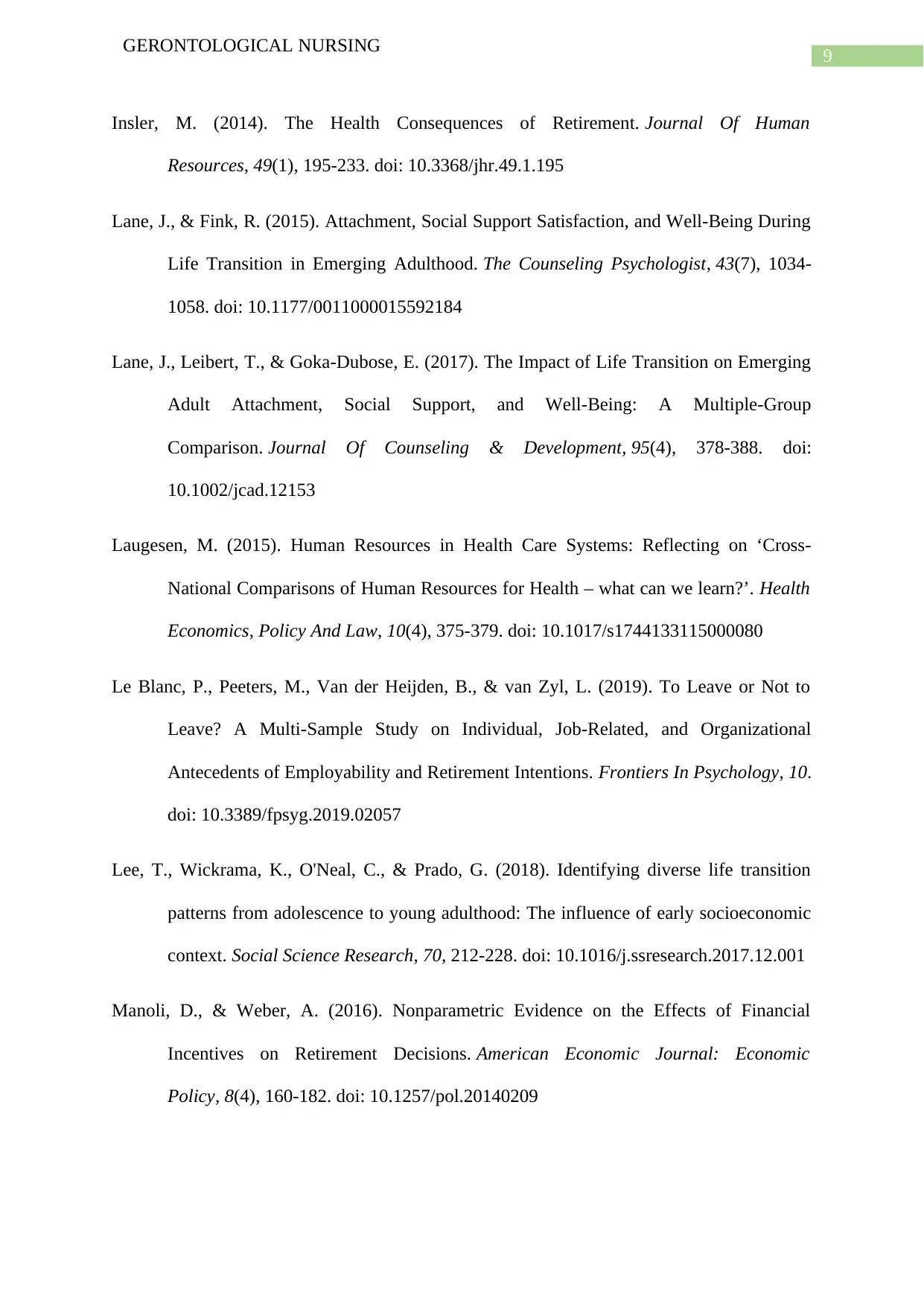
9
GERONTOLOGICAL NURSING
Insler, M. (2014). The Health Consequences of Retirement. Journal Of Human
Resources, 49(1), 195-233. doi: 10.3368/jhr.49.1.195
Lane, J., & Fink, R. (2015). Attachment, Social Support Satisfaction, and Well-Being During
Life Transition in Emerging Adulthood. The Counseling Psychologist, 43(7), 1034-
1058. doi: 10.1177/0011000015592184
Lane, J., Leibert, T., & Goka-Dubose, E. (2017). The Impact of Life Transition on Emerging
Adult Attachment, Social Support, and Well-Being: A Multiple-Group
Comparison. Journal Of Counseling & Development, 95(4), 378-388. doi:
10.1002/jcad.12153
Laugesen, M. (2015). Human Resources in Health Care Systems: Reflecting on ‘Cross-
National Comparisons of Human Resources for Health – what can we learn?’. Health
Economics, Policy And Law, 10(4), 375-379. doi: 10.1017/s1744133115000080
Le Blanc, P., Peeters, M., Van der Heijden, B., & van Zyl, L. (2019). To Leave or Not to
Leave? A Multi-Sample Study on Individual, Job-Related, and Organizational
Antecedents of Employability and Retirement Intentions. Frontiers In Psychology, 10.
doi: 10.3389/fpsyg.2019.02057
Lee, T., Wickrama, K., O'Neal, C., & Prado, G. (2018). Identifying diverse life transition
patterns from adolescence to young adulthood: The influence of early socioeconomic
context. Social Science Research, 70, 212-228. doi: 10.1016/j.ssresearch.2017.12.001
Manoli, D., & Weber, A. (2016). Nonparametric Evidence on the Effects of Financial
Incentives on Retirement Decisions. American Economic Journal: Economic
Policy, 8(4), 160-182. doi: 10.1257/pol.20140209
GERONTOLOGICAL NURSING
Insler, M. (2014). The Health Consequences of Retirement. Journal Of Human
Resources, 49(1), 195-233. doi: 10.3368/jhr.49.1.195
Lane, J., & Fink, R. (2015). Attachment, Social Support Satisfaction, and Well-Being During
Life Transition in Emerging Adulthood. The Counseling Psychologist, 43(7), 1034-
1058. doi: 10.1177/0011000015592184
Lane, J., Leibert, T., & Goka-Dubose, E. (2017). The Impact of Life Transition on Emerging
Adult Attachment, Social Support, and Well-Being: A Multiple-Group
Comparison. Journal Of Counseling & Development, 95(4), 378-388. doi:
10.1002/jcad.12153
Laugesen, M. (2015). Human Resources in Health Care Systems: Reflecting on ‘Cross-
National Comparisons of Human Resources for Health – what can we learn?’. Health
Economics, Policy And Law, 10(4), 375-379. doi: 10.1017/s1744133115000080
Le Blanc, P., Peeters, M., Van der Heijden, B., & van Zyl, L. (2019). To Leave or Not to
Leave? A Multi-Sample Study on Individual, Job-Related, and Organizational
Antecedents of Employability and Retirement Intentions. Frontiers In Psychology, 10.
doi: 10.3389/fpsyg.2019.02057
Lee, T., Wickrama, K., O'Neal, C., & Prado, G. (2018). Identifying diverse life transition
patterns from adolescence to young adulthood: The influence of early socioeconomic
context. Social Science Research, 70, 212-228. doi: 10.1016/j.ssresearch.2017.12.001
Manoli, D., & Weber, A. (2016). Nonparametric Evidence on the Effects of Financial
Incentives on Retirement Decisions. American Economic Journal: Economic
Policy, 8(4), 160-182. doi: 10.1257/pol.20140209
Paraphrase This Document
Need a fresh take? Get an instant paraphrase of this document with our AI Paraphraser
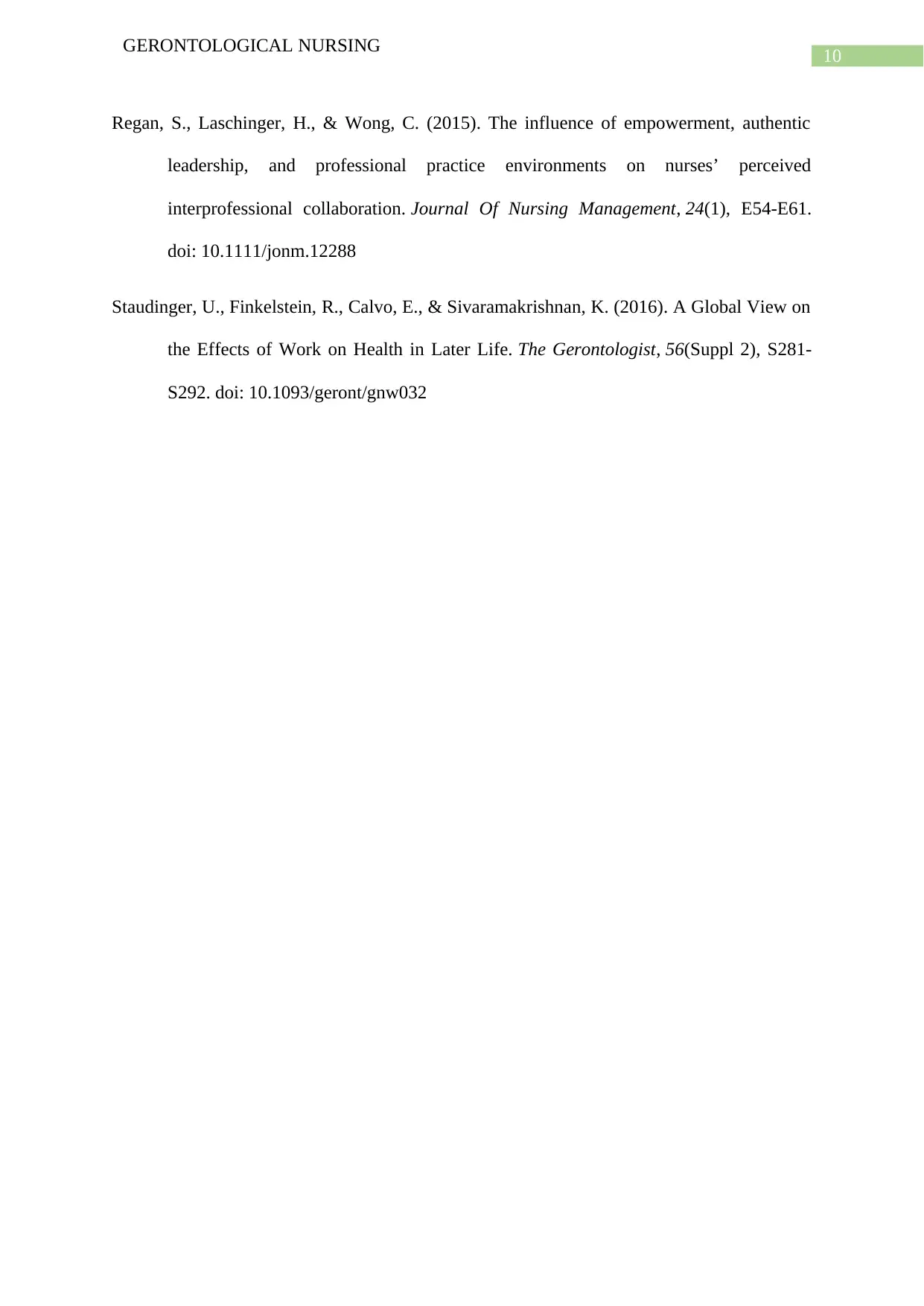
10
GERONTOLOGICAL NURSING
Regan, S., Laschinger, H., & Wong, C. (2015). The influence of empowerment, authentic
leadership, and professional practice environments on nurses’ perceived
interprofessional collaboration. Journal Of Nursing Management, 24(1), E54-E61.
doi: 10.1111/jonm.12288
Staudinger, U., Finkelstein, R., Calvo, E., & Sivaramakrishnan, K. (2016). A Global View on
the Effects of Work on Health in Later Life. The Gerontologist, 56(Suppl 2), S281-
S292. doi: 10.1093/geront/gnw032
GERONTOLOGICAL NURSING
Regan, S., Laschinger, H., & Wong, C. (2015). The influence of empowerment, authentic
leadership, and professional practice environments on nurses’ perceived
interprofessional collaboration. Journal Of Nursing Management, 24(1), E54-E61.
doi: 10.1111/jonm.12288
Staudinger, U., Finkelstein, R., Calvo, E., & Sivaramakrishnan, K. (2016). A Global View on
the Effects of Work on Health in Later Life. The Gerontologist, 56(Suppl 2), S281-
S292. doi: 10.1093/geront/gnw032
1 out of 11
Related Documents
Your All-in-One AI-Powered Toolkit for Academic Success.
+13062052269
info@desklib.com
Available 24*7 on WhatsApp / Email
![[object Object]](/_next/static/media/star-bottom.7253800d.svg)
Unlock your academic potential
Copyright © 2020–2026 A2Z Services. All Rights Reserved. Developed and managed by ZUCOL.





